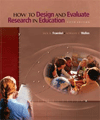 |  How to Design and Evaluate Research in Education, 5/e Jack R. Fraenkel,
San Francisco State University
Norman E. Wallen,
San Francisco State University
Variables and Hypotheses
Main PointsThe Importance of Studying Relationships - Identifying relationships among variables enhances understanding.
- Understanding of relationships helps us to explain the nature of the world in which we live.
Variables - A variable is any characteristic or quality that varies among the members of a particular group.
- A constant is any characteristic or quality that is the same for all members of a particular group.
- Several kinds of variables are studied in educational research, the most common being independent and dependent variables.
- An independent variable is a variable presumed to affect or influence other variables.
- A dependent (or outcome) variable a variable presumed to be affected by one or more independent variables.
- A quantitative variable is a variable that varies in amount or degree, but not in kind.
- A categorical variable is a variable that varies only in kind, not in degree or amount.
- An extraneous variable is an independent variable that may have unintended effects on a dependent variable in a particular study.
Hypotheses - The term "hypothesis," as used in research, usually refers to a prediction of results made before a study commences.
- A significant hypothesis is one that is likely to lead, if it is supported, to a greater amount of important knowledge than a nonsignificant hypothesis.
- Stating a research question as a hypothesis has both advantages and disadvantages.
- A directional hypothesis is a prediction about the specific nature of a relationship -- for example, method A is more effective than method B.
- A nondirectional hypothesis is a prediction that a relationship exists without specifying its exact nature -- for example, there will be a difference between method A and method B (without saying which will be more effective).
|
|



 2003 McGraw-Hill Higher Education
2003 McGraw-Hill Higher Education